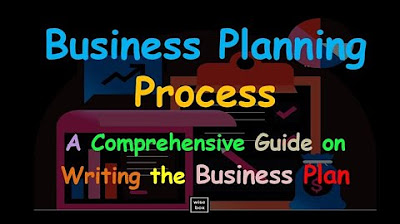Business Plans
Summary
TLDRThis video explains the key components of a business plan, starting with the executive summary and covering aspects like market research, operations, staffing, and financial projections. It highlights the advantages of creating a business plan, such as understanding finances, managing risks, and attracting investors. However, it also discusses the limitations, emphasizing the importance of flexibility, realistic projections, and the potential consequences of inexperience. The video underscores the need for careful planning to ensure business success while remaining adaptable to real-world changes.
Takeaways
- 📄 A business plan outlines what a business intends to achieve and how it will do so.
- 📝 The business plan usually starts with an executive summary, providing a brief overview of the business's goals and strategies.
- 💡 Key components of a business plan include the business name, idea, USP (unique selling point), and aims and objectives.
- 📊 Market research (both primary and secondary) and a marketing strategy are essential parts of the plan to drive sales and awareness.
- ⚙️ The operations section outlines how the business will produce its product or service, and staffing needs are also covered.
- 💰 Financial planning is crucial, including budgets, projected income statements, and potential staffing costs.
- 👥 Information about the entrepreneur or entrepreneurs and their expertise is often included to highlight the business's potential for success.
- 📈 A key advantage of a business plan is financial clarity, enabling the creation of forecasts like budgets, break-even points, and cash flow projections.
- 💵 Having a business plan increases the likelihood of securing external financing, such as loans or investments, though it's not guaranteed.
- ⚠️ Limitations of business plans include the possibility of overestimating sales, underestimating costs, and the need for flexibility as real-world factors may differ from the plan.
Q & A
What is a business plan?
-A business plan is a document that outlines what a business intends to do, covering its goals, strategies, and how it plans to achieve them.
What is typically included in the executive summary of a business plan?
-The executive summary is a concise overview of everything the business expects to do, summarizing key points like objectives, strategies, and finances.
What are some key components of a business plan?
-Key components include the business name, unique selling point (USP), aims and objectives, market research, marketing overview, operational plans, staffing needs, financial projections, and details about the entrepreneurs.
How can a business plan help in managing finances?
-A business plan helps in understanding finances by allowing for budget forecasts, break-even analysis, cash flow forecasts, and managing liquidity.
Why is a business plan useful when seeking external finance?
-A well-prepared business plan increases the likelihood of obtaining a loan from a bank or attracting investment from shareholders as it provides a clear outline of the business's financial health and strategy.
How does creating a business plan help entrepreneurs analyze their business?
-A business plan allows entrepreneurs to inspect each aspect of their business in detail, helping them identify gaps and better understand how different parts of the business connect.
What is a major limitation of a business plan?
-One major limitation is that a business plan is only a plan, and real-world conditions may differ significantly, requiring adjustments as the business environment changes.
Why is the experience of the person creating the business plan important?
-The experience of the person creating the business plan is important because inexperienced entrepreneurs may overestimate revenues or underestimate costs, leading to inaccurate projections and potential liquidity issues.
How can inaccurate financial projections in a business plan affect the business?
-Inaccurate financial projections can lead to liquidity issues, causing the business to run out of cash or requiring additional, unexpected sources of finance.
Why is flexibility important in a business plan?
-Flexibility is important because external conditions may change, and the business plan must be adaptable to address new challenges or opportunities that arise.
Outlines

This section is available to paid users only. Please upgrade to access this part.
Upgrade NowMindmap

This section is available to paid users only. Please upgrade to access this part.
Upgrade NowKeywords

This section is available to paid users only. Please upgrade to access this part.
Upgrade NowHighlights

This section is available to paid users only. Please upgrade to access this part.
Upgrade NowTranscripts

This section is available to paid users only. Please upgrade to access this part.
Upgrade NowBrowse More Related Video
5.0 / 5 (0 votes)





